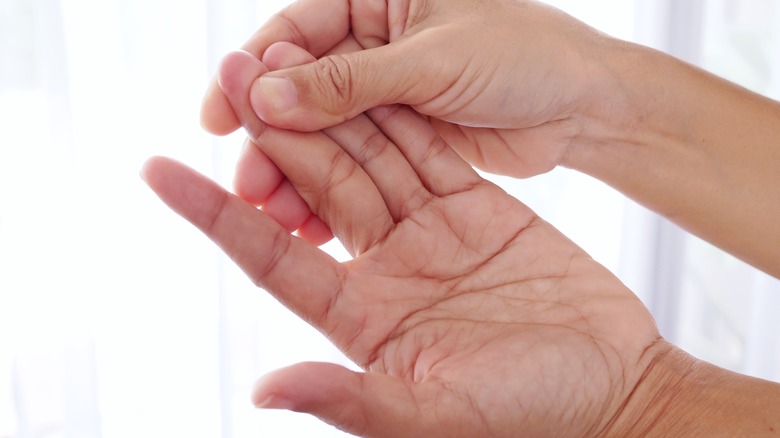What Happens To Our Sense Of Touch As We Age?
Aging brings along a cluster of changes, according to BMC Neurology. Our skin may lose elasticity and our cognitive functions become less nimble. But we may also gain more emotional resilience and wisdom over time.
Much like the rest of our senses, our sense of touch gradually declines as we get older (via Neuroscience). This is a normal part of the aging process. Beyond the age of 60, some people may start to notice that their skin is less sensitive than it once was. They may be less responsive to stimuli, and their ability to detect pain, warmth, and coldness weakens. However, these changes vary across individuals and may be more noticeable in some than others.
The research on age-related tactile impairment is fairly limited, per Neuroscience. But there's evidence that a diminishing sense of touch can have negative consequences for both physical and mental health, even if it happens progressively over time, says Healthcare.
How our sense of touch changes as we age
A number of changes occur in the skin, which may account for the gradual lessening of touch sensitivity, writes Neuroscience. The skin loses its elasticity and firmness and becomes less taut over time. As a result, older adults may not immediately notice that they have a cut or bruise, as they're generally less susceptible to pain. On the other hand, gentle touch can start to feel more pleasant.
Changes in the somatosensory system play an important role in age-related tactile decline (via Journal of Anatomy). This is the network of receptors and neurons that receive and process information about the body's sensations, position, and movement, writes Dana Foundation. As the brain and body age, there's a gradual drop in the number of touch-sensing receptors and nerve endings across the skin, per Neuroscience.
The hands hold more nerve endings than the legs, elbows, or back –- the fingers, in particular, are densely packed with sensory neurons (via Scientific American). An older adult may notice that their fingertips are less sensitive than they once were. And as the skin grows less elastic, it becomes harder for people to be fingerprinted with a scanner (per Scientific American).
The negative impact on emotional well-being
Physical touch is an important ingredient in well-being (via Developmental Review). Touch enables us to communicate how we feel, facilitating interpersonal relationships. Hugging and other forms of intimate or friendly touching cause the brain to release oxytocin -– one of our main "feel-good" hormones. This, in turn, helps us feel less stressed by reducing cortisol levels, heart rate, and blood pressure.
This may explain why massage is such a powerful therapy for people in residential care, according to a study from the International Journal of Older People Nursing — it improves sleep, emotional well-being, and psychosocial health. The benefits of physical touch are far-reaching.
A loss of sensory function in older adults is associated with depression, greater social isolation, poorer ability to function in daily living, and higher mortality, says Healthcare. A deteriorating sense of touch, in particular, is linked to an increase in falls and fractures. These changes usually happen gradually, which means that people have some time to adapt, but that doesn't necessarily make it easier.
Those with strong social networks and greater emotional support are generally better able to cope with the loss of sensory acuity, per Healthcare. Older adults may not be able to stop or slow down tactile impairment, but having positive relationships and social connections may help them feel less vulnerable.



